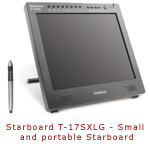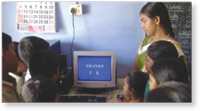 Smt. D. Purandeswari
Smt. D. Purandeswari
Minister of State, Higher Education, Ministry of Human Resource Development, Government of India
Smt. D Purandeswari, Minister of State, Higher Education, Ministry of Human Resource Development, believes that reforms in the education sector, being an ongoing process, should respond to the needs and requirements of any country. She shares with digitalLEARNING her experience of serving a second term in the Department of Higher Education, her mission, and policy objectives.
The major challenge that we have is the low Gross Enrolment Ratio (GER) in Higher Education. As compared to the developed countries, our GER restricted to only 11% to12%.Whereas in the developed countries it is 16%, with International average standard of 23%. Even if we plan to increase our GER to 20%, we know we can not achieve it overnight. Therefore, we have set a target goal of 15% GER, which we plan to achieve by the end of the XIth Five Year Plan in 2012.
Please share with our readers your immediate reaction of coming to the same Department in a repeat term?
It is definitely a wonderful feeling to come back to the same Department again. I have been with this Department for the last two and half years. I am well versed with the issues and challenges of the education sector and the continuity would only enhance my domain knowledge of the same. After I was inducted, I met Shrimati Sonia Gandhi and she opined that I should retain the education portfolio because of my long standing association and engagement with issues relating to education. This is one ministry where the reforms/ programmes that are implemented require continuity and stability.
Is there any mission unaccomplished from your earlier tenure or do you have a fresh agenda to start with?
Reforms in the education sector is an ongoing process. We come up with answers, as the challenges and issues arise. We want to bring reforms in our education system in such a way that it responds to the needs and requirements of our nation.
Public Private Partnerships (PPP) should not encourage ‘profiteering’; rather it should promote accessible and quality education for all.
What are the major challenges of Higher education system in our country?
Our education system must be responsive to the needs of our nation. The major challenge that we have is the low Gross Enrolment Ratio (GER) in Higher Education. As compared to the developed countries, our GER restricted to only 11% to12%.Whereas in the developed countries it is 16%, with International average standard of 23%. Even if we plan to increase our GER to 20%, we know we can not achieve it overnight. Therefore, we have set a target goal of 15% GER, which we plan to achieve by the end of the XIth Five Year Plan in 2012.
Our strategy is to address the following questions: a) How do we intergrate the productive utilisation of Information and Communication Technology (ICT) in education; b) How do we move forward with adult education; c) How do we improve the literacy rate of women; d) How do we bring more girls into our education system; e) How do we address the issues of SC, STs, minorities and tribals? Our department has been seriously mulling over the strategies to work on these crucial issues.
What according to you is the role of ICTs in enhancing and scaling up the education system? What are the e-education strategies that your ministry proposes?
ICT is one of the major components to improve the GER and reduce marginalisation of education and students. We are looking at connecting 20,000 institutions through ICTs. We are also looking at inter-connectivity between 10,000 departments. Edusat has already been working in this field and the current need is to strengthen Edusat.
What are the possible reasons for having a Higher Education Council in place?
There is an urgent need to have a Higher Education Council where all the regulatory bodies can be brought under one umbrella. The AICTE was constituted with this intention. However the overlapping responsibilities of AICTE with other regulatory bodies like Medical Council of India (MCI) and UGC had resulted in duplication and unnecessary hurdles. To usher in synergies between different regulatory bodies and rope in more coordination, we felt the need to have the Higher Education Council. As we progress today, and Shri Kapil Sibal (Minister, HRD) also feels that, we need a Higher Education Council where all of the regulatory bodies could be brought under one umbrella.
What are the plans of your Ministry for bridging the gender disparity and encouraging women as far as Higher Education is concerned?
There are many programmes and schemes proposed by the Government to address this specific sphere of concern. There are various facilitating programmes introduced and initiated by UGC and AICTE to support women’s education. For a single girl child, there is a fee waiver at higher education. There are special scholarships for girl children. AICTE has relaxed the norms for establishing engineering colleges for women. In order to set up an engineering college, one requires five acres of land, but for a girls engineering institution, the norm is only 2.5 acres of land. At the same time, UGC is providing for exclusive Girls hostel to encourage girls from rural areas to pursue higher studies. Thanks to this, the literacy rate of women, which was meager earlier, is now 54%.
How do you see the engagement of Public Private Partnership (PPP) in the education sector?
We all know very well and acknowledge that Private sectors have supplemented the efforts of the government in education; otherwise there would not have been such a proliferation of the technical education institutions. We appeal to them that ‘Profiteering’ can not be the motive of PPP. The motive is to give quality education and making education accessible to all. The National Policy on Education and the all the Supreme Court judgments have clearly stated that education is not for profiteering and one cannot come with business motive.










 Shilpa couldn't conceal her excitement when she was offered admission to the BSc Computer Science Honors program at Delhi University. It was her dream to become a software programmer with specialisation in animation. After all, it was only a year back when she often wondered if her dream was ever going to be realised.
Shilpa couldn't conceal her excitement when she was offered admission to the BSc Computer Science Honors program at Delhi University. It was her dream to become a software programmer with specialisation in animation. After all, it was only a year back when she often wondered if her dream was ever going to be realised. The first thing her father did on becoming a travel agent was to buy a computer. He operated his business out of his own home and consequently Shilpa and her elder sister started experimenting with the newly acquired toy, much to the annoyance of their mother. The mother would often complain to her husband about the valuable time being wasted away on the computer. But that didn't deter Shilpa. She was amazed by the vast amount of knowledge available on the web. Most importantly, she felt she knew what she wanted to do with her career.
The first thing her father did on becoming a travel agent was to buy a computer. He operated his business out of his own home and consequently Shilpa and her elder sister started experimenting with the newly acquired toy, much to the annoyance of their mother. The mother would often complain to her husband about the valuable time being wasted away on the computer. But that didn't deter Shilpa. She was amazed by the vast amount of knowledge available on the web. Most importantly, she felt she knew what she wanted to do with her career.  HCL Infosystems, India's premier information enabling company has entered into a tie-up with Delhi University for imparting ICT training to students. University of Delhi's Campus of Open Learning (COL) has introduced various short-term professional training programs to bridge the skill-gap of its students. As part of this initiative, COL has signed an MoU with HCL Infosystems for conducting programmes on ICT and web technology at its Centre for Professional and Technical Training, Keshav Puram. This tie-up aims to create a new generation of highly-skilled IT professionals who possess the industry perspective and practical understanding to become employable and productive from day one.
HCL Infosystems, India's premier information enabling company has entered into a tie-up with Delhi University for imparting ICT training to students. University of Delhi's Campus of Open Learning (COL) has introduced various short-term professional training programs to bridge the skill-gap of its students. As part of this initiative, COL has signed an MoU with HCL Infosystems for conducting programmes on ICT and web technology at its Centre for Professional and Technical Training, Keshav Puram. This tie-up aims to create a new generation of highly-skilled IT professionals who possess the industry perspective and practical understanding to become employable and productive from day one. As part of the tie-up, HCL will offer six months programme which will include courses like Linux with Convergence Technologies Innovation (LCTI), Web Development Using PHP (WDPHP) and Web Designing (WD) for students. The course will be an ideal combination of conceptual instruction and practical exposure for four months, followed by industry internship for two months. Application form and further details are available at
As part of the tie-up, HCL will offer six months programme which will include courses like Linux with Convergence Technologies Innovation (LCTI), Web Development Using PHP (WDPHP) and Web Designing (WD) for students. The course will be an ideal combination of conceptual instruction and practical exposure for four months, followed by industry internship for two months. Application form and further details are available at  FX-Series Starboard (Essential interactive whiteboard for teaching, presentations & meetings) is made without embedding any wires in the board itself. This allows the board to be functional even in case the board surface is dented.
FX-Series Starboard (Essential interactive whiteboard for teaching, presentations & meetings) is made without embedding any wires in the board itself. This allows the board to be functional even in case the board surface is dented.  INTERNET CONNECTIVITY:
INTERNET CONNECTIVITY:  CONFERENCING:
CONFERENCING:


 PROJECT: Implementation of shared computing technology benefiting 1.8 million students in 5,000 government schools in Andhra Pradesh in 4 months
PROJECT: Implementation of shared computing technology benefiting 1.8 million students in 5,000 government schools in Andhra Pradesh in 4 months  PROJECT: SIET, Kerala
PROJECT: SIET, Kerala  PROJECT: Programme for distribution of valuable bon certificates
PROJECT: Programme for distribution of valuable bon certificates  Smt. D. Purandeswari
Smt. D. Purandeswari Shri Subhash C Khuntia, Joint Secretary, Ministry of Human Resource Development, shares with digital Learning, in an exclusive interview, his vision on Information and Communication Technology (ICT) practices in school education, the role of innovation in schools and his department`s commitment to present a policy framework on ICT in school education.
Shri Subhash C Khuntia, Joint Secretary, Ministry of Human Resource Development, shares with digital Learning, in an exclusive interview, his vision on Information and Communication Technology (ICT) practices in school education, the role of innovation in schools and his department`s commitment to present a policy framework on ICT in school education. 








